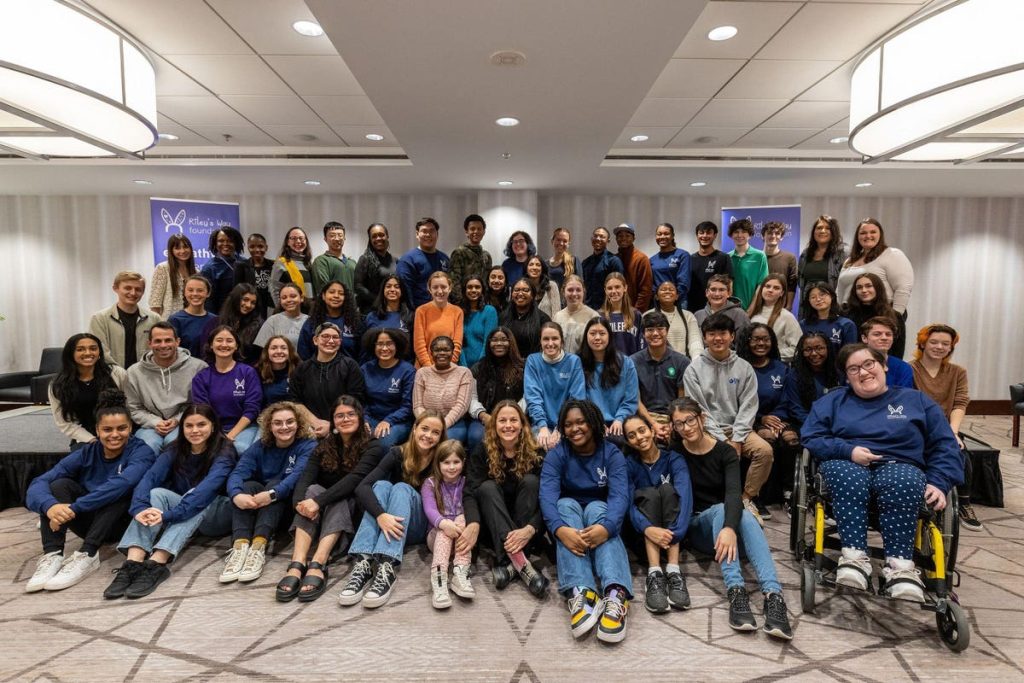The non-profit Riley’s Way has a bold vision: a future where kind leaders build a better world. Founders Ian and Mackenzie Sandler’s innovative approach to investing in future leaders with a passion for kindness is already having an impact on over 300 high-potential youth receiving grants for change-making initiatives that foster empathy, collaboration and inclusion.
Investing is not new to Ian. He joined the investment sector in 2003, working for Morgan Stanley. Today, he’s the COO at Insight Partners, a leading global venture capital and private equity firm that invests in high-growth technology and software companies that drive transformative change in their industries. While managing a firm focused on investing in startups is his day job, investing in high-potential youth to create a “kindness movement” is his passion.
Ian and his wife, Mackenzie, founded Riley’s Way in memory of their late, nine-year-old daughter, Riley, whose tragically short life was filled with kindness. Motivated by their profound loss, the couple set out to empower young individuals as agents of positive transformation by investing in youth. Their efforts epitomize kindness and promote empathy, collaboration and inclusion.
Ian believes investing in high-potential leaders who promote kindness is like investing in high-potential startup companies: “In the investment world, compound interest generates exponential growth through continuous reinvestment. Kindness and collaboration, like the compounding effect of return on investment (ROI), possess an extraordinary power to amplify impact over time. We can easily see the positive impact of our efforts since we founded Riley’s Way in 2014.”
Riley’s Way uses innovative programs and strategic partnerships to equip young people with the tools and skills they need to navigate an interconnected world with grace and empathy. Centripetal to their efforts is the question, “How do we create the scaffolding and support for the next generation of kind leaders?”
The Power of Collaboration: Uniting Youth Leaders Through Riley’s Way Councils
The first program birthed out of Riley’s Way was the “Riley’s Way Councils.” The program unites diverse student leaders from various communities and backgrounds, providing them with a supportive network and a platform to address social challenges collectively.
By fostering collaboration and dialogue, the Councils empower young individuals to work together, leveraging their unique perspectives and experiences to bring about change in their communities.
For example, students from East Harlem’s Young Women’s Leadership School team with students from Nightingale Bamford School. Ian explains, “We put the teenagers together and asked, ‘What breaks your heart?’ They were incredibly forward-thinking on all ranges of issues. They focused on projects like the impact of mass incarceration on families long before the murder of George Floyd. They were concerned about environmental impact, urban sustainability and social inequality. Those Councils became our laboratories on the power of collaboration focused around promoting kindness.”
A National Call for Kindness
Now in its fifth year, one of Riley’s Way’s core programs is the National Call for Kindness. The National Call for Kindness gives young leaders (ages 13 to 22) across the country the skills, connections and funding they need to run social impact projects that inspire kindness and strengthen their local, national or global communities.
The National Call For Kindness consists of a 12-month leadership development fellowship and a startup grant of up to $3,000. Fellows receive one-on-one coaching and project support, virtual skill-building sessions, an in-person leadership retreat, networking, mentorship opportunities and a peer community of other young changemakers. Fellows can also apply for continuation grants with ongoing project support and coaching.
The Riley’s Way National Call for Kindness is all about amplifying the impact of kindness. Ian beams as he reflects on the impact the 300+ National Call for Kindness leaders have had. A good example is Dylan Zajac of Computers 4 People. Zajac takes refurbished computers from organizations, cleans them up, repairs them and distributes them to people who otherwise wouldn’t be able to buy them.
Ian recalls a mentoring session he had with Zajac:
“I asked Dylan, ‘How can I help you?’ He replied that he had just received $326,920 in grant money from the Federal Communications Commission (FCC) for a grant supporting digital equity initiatives and needed help with contracts for office space and other legal questions around expanding his work. Being in the investment business, I know amazing lawyers, and it was easy to connect Zajac to two lawyers to provide him legal help as he scales his organization.”
Zajac couldn’t be more thrilled with the kindness he has received from Riley’s Way and his mentors: ”Riley’s Way has truly been a game changer for Computers 4 People, providing invaluable support and guidance. As a young entrepreneur, their instrumental role in supporting my vision has been transformative. They have not only provided funding, but they have forged partnerships with mentors, lawyers, and business leaders that have helped me succeed. Additionally, their introductions to schools throughout NYC have enabled the distribution of 80+ laptops to college-bound students, bridging the digital divide and advancing academic success.”
Compounding Collaboration
Zajac is just one example of the 300+ National Call for Kindness changemakers Riley’s Way supports. In addition, the foundation has 250 Council members, 800+ alumni and 400 youth leadership retreat participants who are all leading the kindness movement.
Ian is quick to point out that the real, long-term benefit goes well beyond the impact of any one of the Riley’s Way changemakers with their kindness initiatives. With each new project, partnership and forged connection, the Riley’s Way movement grows.
Concludes Ian, “Riley’s Way is teaching these kind changemakers skills and giving them the network they need as they grow and become tomorrow’s leaders. The multiplier effect is so immense, it’s challenging to quantify. Just think about how much better the world will be with leaders who embody empathy, collaboration and inclusion.”
Read the full article here










